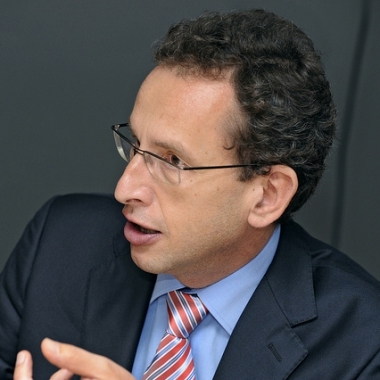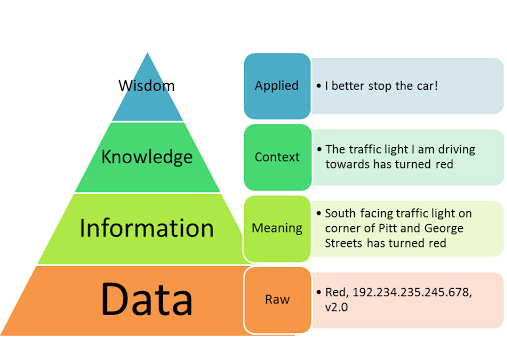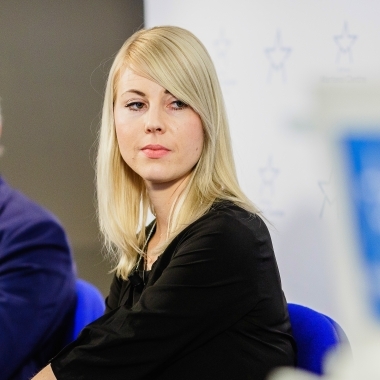-
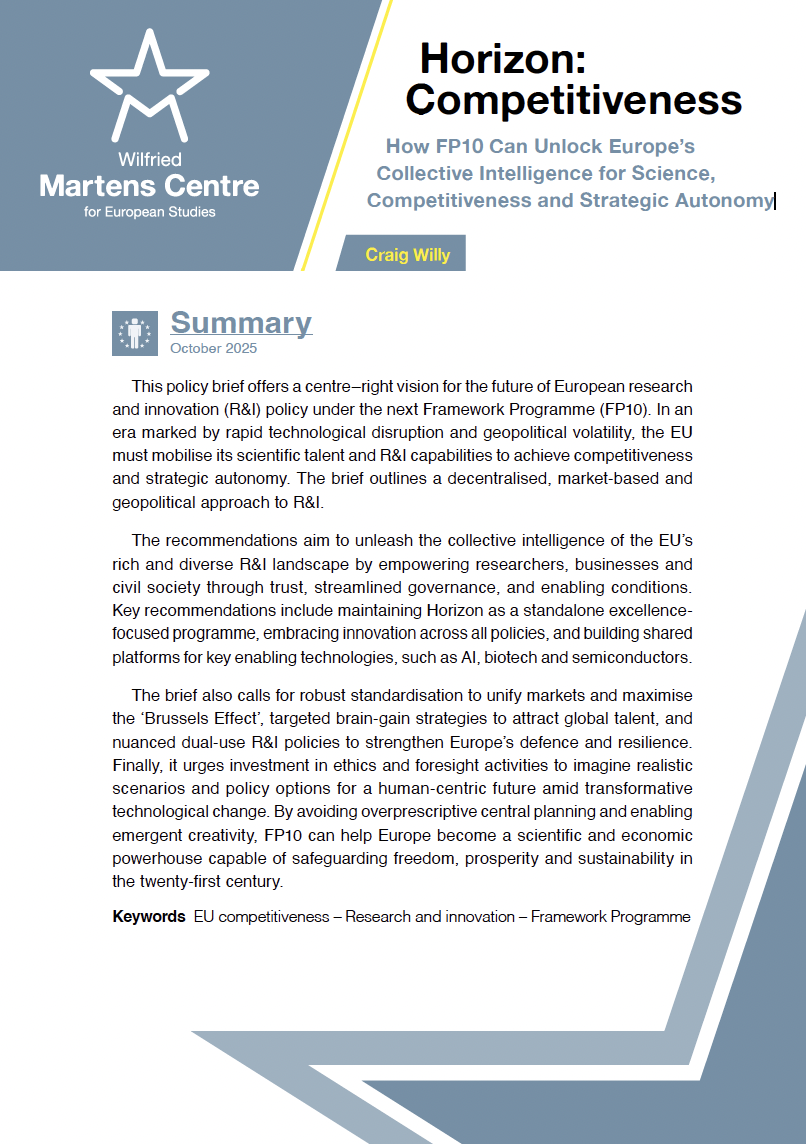
Horizon: Competitiveness – How FP10 Can Unlock Europe’s Collective Intelligence for Science, Competitiveness and Strategic Autonomy
Policy Briefs
28 Oct 2025
-
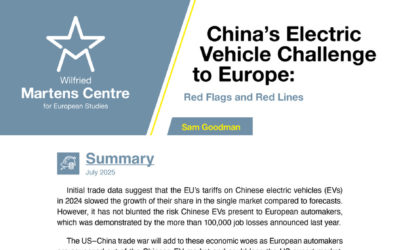
China’s Electric Vehicle Challenge to Europe: Red Flags and Red Lines
Policy Briefs
08 Jul 2025
-

Brussels is About to Protect Citizens from Intelligence
Blog
13 Feb 2024
-

Transatlantic Trade and Technology: Partners or Rivals?
Collaborative
25 Jan 2024
-
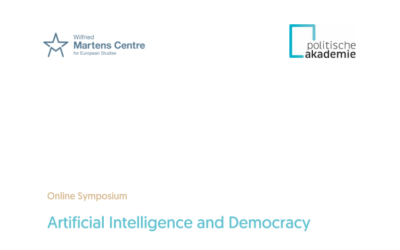
Artificial Intelligence and Democracy
Collaborative
01 Feb 2023
-
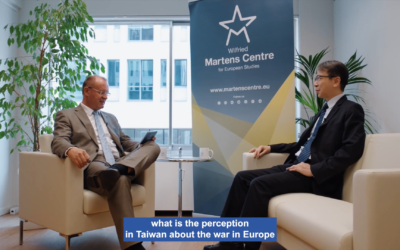
Thinking Talks Ep.6 with Ming-Yen Tsai, Ambassador, Taipei Representative Office in the EU & Belgium
Multimedia - Thinking Talks - Ukraine
27 Jul 2022
-
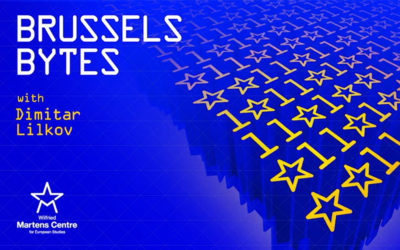
Data Protection and Cybersecurity with Vagelis Papakonstantinou
Brussels Bytes
10 Jun 2022
-
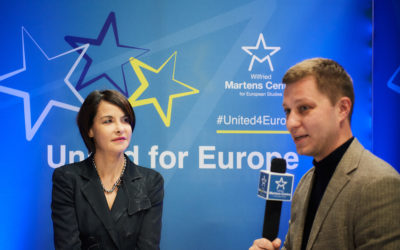
Cybersecurity and 5G – What is at Stake for the EU and the US?
Multimedia - Other videos
01 Jun 2022
-
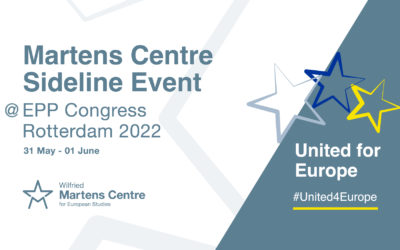
EPP Congress – Day 1 Afternoon Streaming
Live-streams - Multimedia
31 May 2022
-
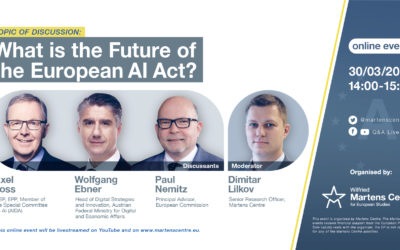
What is the Future of the European AI Act?
Live-streams - Multimedia
30 Mar 2022
-

Russian War Propaganda and Online Disinformation with Monika Richter
Brussels Bytes - Ukraine
16 Mar 2022
-

Breaking the “Great Wall”: How Europe can Deal With an Isolating China
Blog
14 Mar 2022
-

The Facebook Files and Algorithmic Decision-Making with Angela Müller, Ph.D.
Brussels Bytes
27 Jan 2022
-

The EU-US Trade & Technology Council: Red Light & Green Light
Blog
20 Dec 2021
-
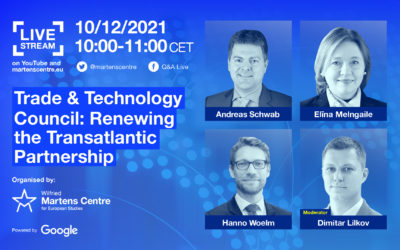
Trade & Technology Council: Renewing the Transatlantic Partnership
Live-streams - Multimedia
10 Dec 2021
-

The EU’s Failure to Protect Our Online Privacy and Data Rights, with Dr. Johnny Ryan
Brussels Bytes
21 Oct 2021
-
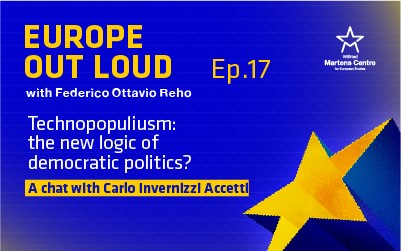
[Europe Out Loud] Technopopulism: the new logic of democratic politics? A chat with Carlo Invernizzi Accetti
Europe out Loud
23 Jul 2021
-

GDPR reform and European digital sovereignty with Axel Voss
Brussels Bytes
13 Jul 2021
-
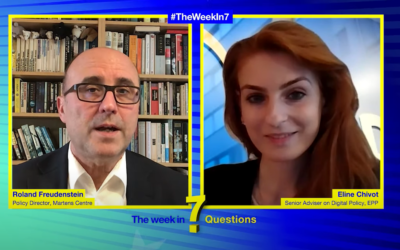
The Week in 7 Questions with Eline Chivot
Multimedia - Other videos
09 Jul 2021
-
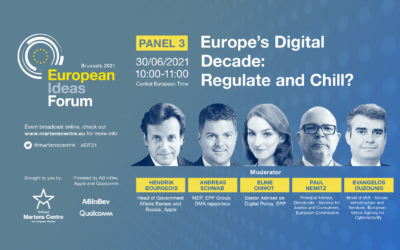
EIF21 Panel 3 – Europe’s Digital Decade: Regulate and Chill?
Live-streams - Multimedia
30 Jun 2021
-

Green and Digital Transition: Challenges and Prospects
Live-streams - Multimedia
15 Jun 2021
-
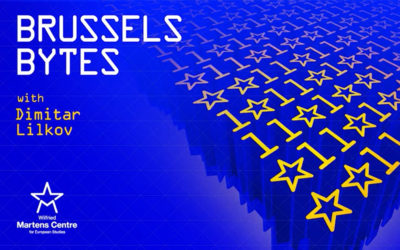
AI and Biometric Mass Surveillance with Ella Jakubowska
Brussels Bytes
11 May 2021
-
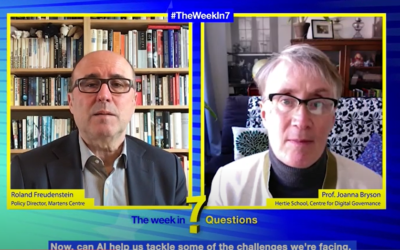
The Week in 7 Questions with Prof. Joanna Bryson
Multimedia - Other videos
30 Apr 2021
-

Artificial Intelligence and Governance: Going Beyond Ethics
Live-streams - Multimedia
29 Apr 2021
-

Disinformation, regulating digital companies, and election interference online with Felix Kartte
Brussels Bytes
12 Apr 2021
-

An Urban Renewal: The Role of European Cities in our Future
Live-streams - Multimedia
17 Feb 2021
-

The Week in 7 Questions with Dimitar Lilkov
Multimedia - Other videos
12 Feb 2021
-

Big Tech and Free Speech
Live-streams - Multimedia
12 Feb 2021
-
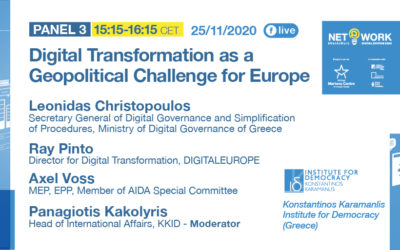
NET@WORK Day 1 – Panel 3
Live-streams - Multimedia
25 Nov 2020
-

Is the Digital Markets Act giving the European Economy and Consumers what they need right now?
Live-streams - Multimedia
17 Nov 2020
-

The Digital Services Act and digital fundamental rights with Eliška Pírková
Brussels Bytes
05 Nov 2020
-

EIF 2020 – Panel 4: Artificial Intelligence
Live-streams - Multimedia
28 Oct 2020
-

EIF 2020 – Panel 3: Digital Europe
Live-streams - Multimedia
28 Oct 2020
-

Online Event ‘EU Ambitions for a Competitive Digital Marketplace: a Toolkit’
Live-streams - Multimedia
23 Sep 2020
-

Autonomous Vehicles: The Need for a Separate European Legal Framework
Blog
18 Sep 2020
-

Cybersecurity technology roams unsupervised. Here’s why that needs to change
Blog
20 Jul 2020
-
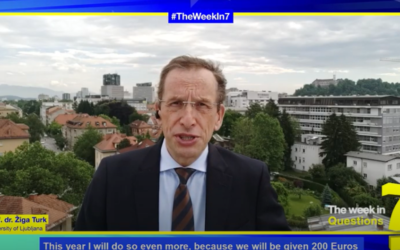
The Week in 7 Questions with Žiga Turk
Multimedia - Other videos
05 Jun 2020
-

Online Event ‘Privacy and Public Health: Thinking Bigger Than Apps’
Live-streams - Multimedia
28 May 2020
-

Online Event ‘Crisis and Opportunity: Can the pandemic push technology forward?’
Live-streams - Multimedia
20 May 2020
-

Fintech – disrupting the world of finance, with Tsvetelina Kuzmanova
Brussels Bytes
07 May 2020
-

The Week In 7 Questions with Lídia Pereira
Multimedia - Other videos
24 Apr 2020
-

COVID-19 and the digital game-changer momentum
Blog
20 Apr 2020
-

Teaser Video ‘Made in China: Tackling Digital Authoritarianism’
Multimedia - Other videos
26 Mar 2020
-

Nietzsche, nihilism and technology with Dr. Nolen Gertz
Brussels Bytes
24 Feb 2020
-

The European society at a technological juncture with John Frank, Microsoft
Brussels Bytes
15 Jan 2020
-

The European audiovisual sector and the future of digital platforms with David Wheeldon, Sky
Brussels Bytes
21 Nov 2019
-

GDPR, privacy and data governance with Valentina Pavel
Brussels Bytes
30 Sep 2019
-

5G and the future of the European telecom sector with Roslyn Layton
Brussels Bytes
25 Jul 2019
-

Is regulating tech beyond left-right politics with Svetoslav Malinov
Brussels Bytes
25 Jun 2019
-

Democracy in the Age of AI with Paul Nemitz
Brussels Bytes
29 May 2019
-

The Zuckerberg takeaways and what they mean for the EU
Blog
12 Apr 2018
-

Are we prepared for the digital transformation?
Blog
22 Jul 2017
-

The untold war: dogfights in the Aegean
Blog
19 Jul 2017
-

Ukraine’s quiet revolution
Blog - Ukraine
20 Apr 2017
-

Does the EU need a 5th Freedom?
Blog
11 Jan 2017
-

Europe, get ready for the Makers Revolution!
Other News
25 May 2016
-

The cyberspace war: propaganda and trolling as warfare tools
Blog
12 May 2016
-

Digital foreign policy: how digital tools can further Europe’s foreign policy goals
Blog
12 Apr 2016
-

Why it is time to redesign our political system
Blog
09 Sep 2015
-

Crowdsourcing as new instrument in policy-making
Blog
09 Sep 2015
-

The case for election technology
Blog
09 Sep 2015
-

Taking on Google: “We haven’t got the right tools for the digital economy yet”
Other News
26 Jan 2015
-

Belarus: Social Networks and an end to Lukashenka’s regime
Blog
06 Jul 2011
-

Artificial Intelligence: Threats and Opportunities for Europeans
Collaborative
01 Dec 2022
-
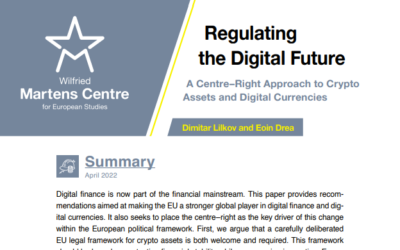
Regulating the Digital Future: A Centre–Right Approach to Crypto Assets and Digital Currencies
Policy Briefs
27 Apr 2022
-

Artificial Intelligence and Governance: Going Beyond Ethics
Research Papers
23 Mar 2021
-
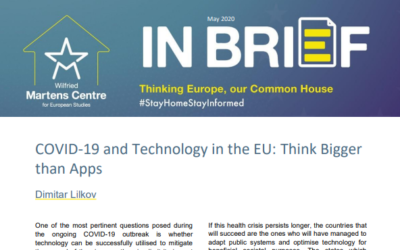
COVID-19 and Technology in the EU: Think Bigger than Apps
IN BRIEF
07 May 2020
-

Fine-Tuning Europe: How to Win the Global FinTech Race?
Research Papers
18 Feb 2020
-
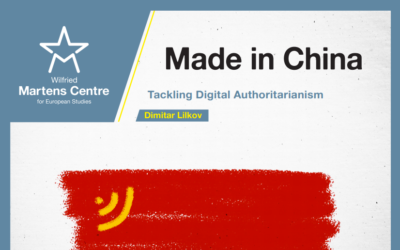
Made in China: Tackling Digital Authoritarianism
Research Papers
11 Feb 2020
-

European Parliament Elections: the Disinformation Challenge
IN BRIEF
24 May 2019
-
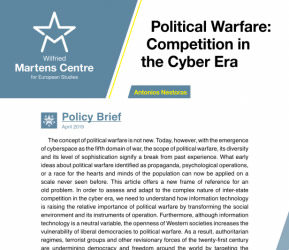
Political Warfare: Competition in the Cyber Era
Policy Briefs
09 Apr 2019
-
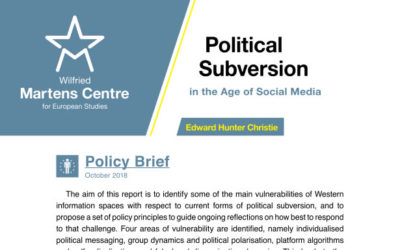
Political Subversion in the Age of Social Media
Policy Briefs
22 Oct 2018
-

The Future of Work: Robots Cooking Free Lunches?
Research Papers
11 Jul 2018
-

The Impact of GDPR on Users and Business: The Good, The Bad and the Uncertain
IN BRIEF
05 Jun 2018
-

Weeding out Fake News: An Approach to Social Media Regulation
Research Papers
11 Jul 2017
-

Telecoms Investment: 3 Steps to Create a Broadband Infrastructure for a Digital Europe
IN FOCUS
07 Sep 2016
-
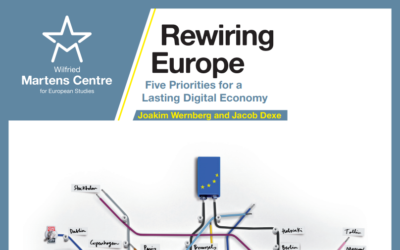
Rewiring Europe: Five Priorities for a Lasting Digital Economy
Research Papers
29 Jun 2016
-

Dawn of the Drones: Europe’s Security Response to the Cyber Age
Research Papers
17 Apr 2015
-

Members of the European Parliament Online: The Use of Social Media in Political Marketing
Research Papers
15 Apr 2013
-

Social Media and Politics – The New Power of Political Influence
Collaborative
18 Dec 2012
-
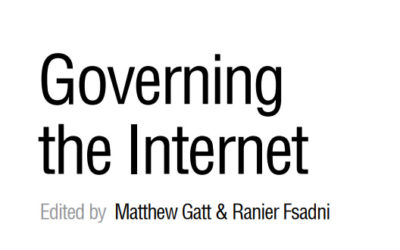
Governing the Internet
Collaborative
01 Dec 2011
-

Maintaining Europe’s Innovative Advantage: EU Policy Responses to the Asian Challenge in Pharmaceutics and Software
Other
01 Feb 2009


